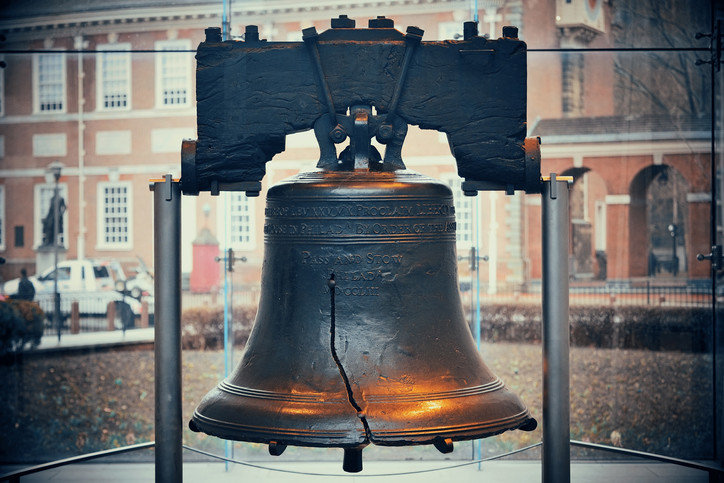Final Expense & Burial Insurance in Pennsylvania

Final expense life insurance, which is also known as funeral insurance or burial insurance, is an affordable way to pay for your final arrangements. This type of insurance can help your family pay for your funeral/burial and can also use the money to help pay off debts, including any medical bills you leave behind.
Buying a burial insurance policy in Pennsylvania is a simple and straightforward process. While the experience will be similar in all states, there is some local information that can help you make a better choice. Here, we’ll touch on the most important aspects of buying this insurance and explain how Lincoln Heritage Funeral Advantage can protect your loved ones.
The Funeral Rule
Federal law dictates basic laws surrounding burial services. Known as the Funeral Rule, these rules apply to every state and are enforced by the Federal Trade Commission (FTC).
- Pricing – Funeral homes must quote prices for products and services over the phone if requested. In person, they must provide a general price list, a casket price list, and a burial container price list (when applicable).
- Contracts – An itemized statement of charges and estimates must be provided before a contract is signed.
- Pre-Need Funeral Plans – FTC laws do not apply to the language of pre-need contracts. They do not govern payment options, costs, modifications, transfers, cancellations, or administrative fees.
Funeral and Burial Expectations in Pennsylvania
Each state has laws that apply after a person dies. Gathering the needed documents, like the death certificate, and planning for the burial and/or cremation can be different state by state. Some counties may have restrictions on where a burial can take place.
Death Certificates
When someone dies, you have to get a death certificate. This is a legal document that provides information about the person who died, including when and how it happened. It will report the place of death as well as their occupation, age, and race. A coroner or other medical professional must sign off on the death certificate. It is easiest to ask the funeral home to file and obtain the original death certificate.
Embalming and Preservation
In Pennsylvania, body preservation is required once the individual has been dead for more than 24 hours. Embalming and refrigeration are the two most common ways to do this. Embalming is not legally required unless you will hold a public viewing more than 24 hours after the death occurs. If you prefer to have a private viewing with close family, you can do that at any time, but the body will have to be refrigerated at the 24-hour mark.
Funeral Basics
If the person that died was being seen by a doctor for a terminal illness or if they were in hospice care, call that care provider. They will confirm the death, and the funeral process can begin. If the death was sudden, call 911.
Within 24 hours of the death, you’ll need to call the funeral director and they will arrange transportation of the body to the funeral home. You will need to make decisions on how the person’s remains will be handled. This is usually by burial or cremation.
People who are buried do not have to be placed in a coffin according to state law, but each burial ground may have specific rules. For instance, a cemetery might require that the body/casket be buried with a vault in place to maintain ground integrity. You do not have to buy this from the funeral home.
Once you have settled on burial or cremation, you may discuss viewing options with your funeral director.
Cremation
Cremation also does not require embalming, but you must provide or purchase a cremation container. There is also a state law that says you cannot cremate within the first 24 hours after the person’s death.
Average Funeral Costs in Pennsylvania
| Item | Average Cost | Price Range |
|---|---|---|
| Basic services | $3,142 | $2,290 - $3,995 |
| Embalming | $810 | $625 - $995 |
| Transportation of remains | $487 | $350 - $625 |
| Casket/alternative container | $7,147 | $2,000 - $14,000 |
| Facility/staff use | $800 | $350 - $1,250 |
| Outer burial container | $5,862 | $975 - $10,750 |
| Direct cremation | $2,825 | $2,425 - $3,225 |
| Direct/immediate burial | $3,460 | $2,925 - $3,995 |
Philadelphia
| Item | Average Cost | Price Range |
|---|---|---|
| Basic services | $1,882 | $775 - $2,990 |
| Embalming | $832 | $695 - $970 |
| Transportation of remains | $485 | $375 - $595 |
| Casket/alternative container | $3,192 | $1,000 - $5,620 |
| Facility/staff use | $812 | $375 - $1,250 |
| Outer burial container | $1,750 | $250 - $3,250 |
| Direct cremation | $1,672 | $775 - $2,570 |
| Direct/immediate burial | $5,000 | $1,500 - $10,145 |
Pittsburgh
| Item | Average Cost | Price Range |
|---|---|---|
| Basic services | $2,247 | $1,400 - $3,000 |
| Embalming | $985 | $675 - $1,294 |
| Transportation of remains | $342 | $295 - $400 |
| Casket/alternative Container | $5,512 | $2,000 - $10,700 |
| Facility/staff use | $560 | $525 - $595 |
| Outer burial container | $5,862 | $975 - $10,750 |
| Direct cremation | $4,100 | $1,480 - $6,720 |
| Direct/immediate burial | $5,500 | $1,420 - $8,000 |
Help with Funeral Costs in Pennsylvania

The vast majority of families pay the bulk of their loved one’s funeral costs. This is done in several ways, including by using savings and through life and burial insurance policies.
Life insurance typically comes in two forms: whole life and term. Another way to pay for a funeral or cremation is with a pre-need plan. Here is some information about each to help you make a decision.
Term Life
If you are fairly young, in good health, and have a family to look out for, term life insurance is a good choice. These types of plans are purchased in “terms” of between five years and 30 years. They pay a death benefit only if you die during the term and your policy is in good standing. Term life insurance is affordable and can be purchased in large amounts to help pay for your family’s basic living costs if you die unexpectedly. Term life policies have to be renewed once the term ends, they get more expensive as you age, and they may be difficult to re-qualify for if your health has changed.
Whole Life
Unlike a term life policy, a whole life insurance plan has rates that never change as long as premiums are paid. These policies make the most sense if you wish to leave something to help cover your end-of-life expenses such as burial costs or unpaid medical bills. The sooner a whole life policy is purchased, the less expensive it will be. Unlike term insurance, whole life policies build cash value that you can borrow against if you need to.
Pre-Need Insurance
A pre-need plan is something you buy directly from a funeral home. They are best defined as a pre-paid funeral service. If you want a pre-need plan, you will need to contact the funeral home and let them know exactly what kind of service you want to have.
When you die, your family will have to contact that funeral home, as the money you paid them is likely nonrefundable and can’t be used anywhere else. If the funeral home did not lock in your prices, your family will have to pay any additional amounts due. This can happen when rates increase, and since funeral homes set their own prices, this can happen at any time. If you decide on a pre-need plan, you may save money by checking prices with several local providers.
Final Expense Insurance
Final expense insurance is more flexible and often more affordable than pre-need insurance. A final expense insurance plan gives your loved ones a cash payout. They can use this money to pay for your funeral, memorial service, and casket or urn, and any money left over may be used to replace lost wages, to settle your debts, or for any other need that comes up. Funeral Advantage is one of the most trusted and widely-available final expense policies in the country.
Every Funeral Advantage policy comes with a free membership to the Funeral Consumer Guardian Society®, a not-for-profit organization that helps save our policyholder families thousands of dollars on funeral costs every year.
Average Overall Costs/Rates for Final Expense Insurance in Pennsylvania
Monthly Premium Rates for Men*
| $5,000 Death Benefit | ||
| Age | Determined 'In Good Health' by Insurer | No Health Questions Asked |
|---|---|---|
| 50 | $16 | $20 |
| 55 | $19 | $24 |
| 60 | $23 | $29 |
| 65 | $29 | $35 |
| 70 | $38 | $44 |
| 75 | $51 | $63 |
| 80 | $65 | $82 |
* Estimated rates do not reflect the rates of any particular life insurance company.
| $10,000 Death Benefit | ||
| Age | Determined 'In Good Health' by Insurer | No Health Questions Asked |
|---|---|---|
| 50 | $30 | $40 |
| 55 | $35 | $46 |
| 60 | $43 | $57 |
| 65 | $56 | $68 |
| 70 | $74 | $88 |
| 75 | $100 | $125 |
| 80 | $126 | $162 |
* Estimated rates do not reflect the rates of any particular life insurance company.
Monthly Premium Rates for Women*
| $5,000 Death Benefit | ||
| Age | Determined 'In Good Health' by Insurer | No Health Questions Asked |
|---|---|---|
| 50 | $14 | $15 |
| 55 | $16 | $18 |
| 60 | $18 | $24 |
| 65 | $22 | $28 |
| 70 | $28 | $35 |
| 75 | $38 | $46 |
| 80 | $48 | $64 |
* Estimated rates do not reflect the rates of any particular life insurance company.
| $10,000 Death Benefit | ||
| Age | Determined 'In Good Health' by Insurer | No Health Questions Asked |
|---|---|---|
| 50 | $25 | $28 |
| 55 | $28 | $36 |
| 60 | $33 | $45 |
| 65 | $41 | $55 |
| 70 | $53 | $69 |
| 75 | $72 | $90 |
| 80 | $93 | $126 |
* Estimated rates do not reflect the rates of any particular life insurance company.
Leading Causes of Death in Pennsylvania

Heart disease is the leading cause of death nationwide. In Pennsylvania, heart disease also reigns, but is followed closely by cancer and accidents. Here are the top 10 causes of death in the state, according to the Centers for Disease Control (CDC):
- Heart disease
- Cancer
- Accidents
- Stroke
- Chronic lower respiratory disease
- Diabetes
- Alzheimer's disease
- Kidney disease
- Flu/pneumonia
- Septicemia
No Exam in Pennsylvania
Most term insurance policies require a medical exam, but final expense policies can often be issued based on answers to health questions on the application – no exam is necessary. The application process is easy and coverage can usually be issued in days – not weeks.
Funeral Advantage policies from Lincoln Heritage don’t require a medical exam to qualify. Just answer health questions on our 1-page application.
Free Look Period
When buying burial insurance in Pennsylvania, make sure to ask your agent about anything that you do not understand. And remember, you have at least 10 days to look over your policy and change your mind. This is commonly called the “free look period,” and is the perfect opportunity to get to know your policy. If you decide it is not right for you, you have the right to receive a full refund within this time-frame.
How to Get Burial Insurance in Pennsylvania
Lincoln Heritage proudly offers free, no obligation final expense insurance quotes for Pennsylvania residents. Contact us today to see how Funeral Advantage can give you peace of mind knowing your loved ones are protected and that your final expenses are covered.


